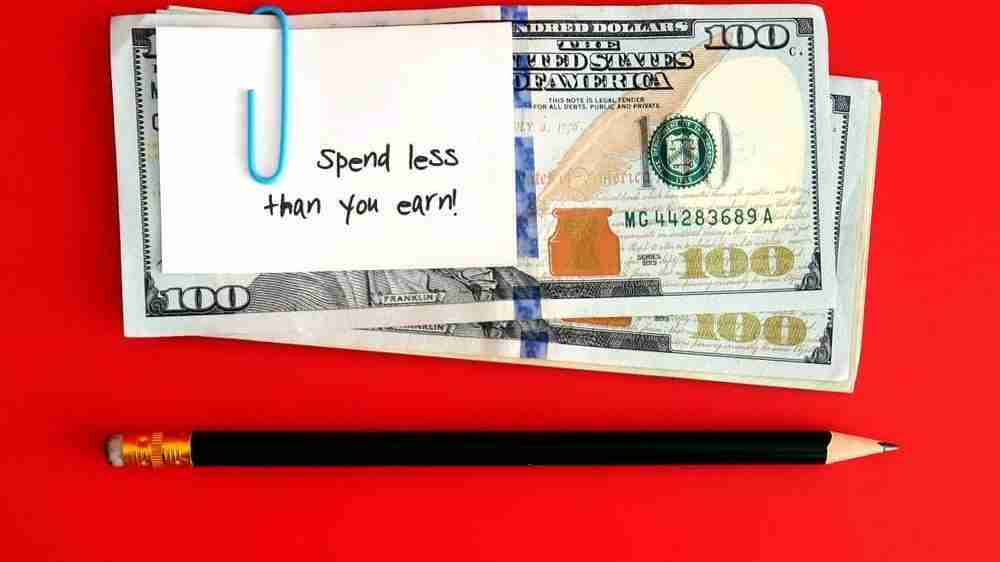This article includes links which we may receive compensation for if you click, at no cost to you.

What does it mean to live within your means?
“Living below your means” is to spend less than you make each month. In other words, if you’re not in credit card debt and not waiting for the next paycheck so you can afford to pay your bills, you are living within your means.
Spending less than you make is one the foundational concepts within the personal finance space and one of the first steps a person can take on their path towards financial success.
In this article we will discuss how to live below your means, signs you’re living beyond your means, unexpected benefits, and some tips and tricks along the way.
Signs you’re living beyond your means
- You have credit card debt. This is the number one sign that you’re living beyond your means. If you have credit card debt just from daily expenses, then this a major warning sign.
- You’re not contributing to a retirement account. If are not contributing any money to an employer-sponsored retirement account, or an IRA if you are self-employed.
- You don’t have emergency savings. In general, most experts recommend having 3-6 months worth of expenses in your emergency savings, however, if you have 0 or nowhere near this amount, it’s an obvious sign you may be living beyond your means.
- Spending money because you “need” something. There’s a clear difference between needs and wants. And if you constantly find yourself justifying why you need to buy that new pair or shoes or go on another vacation, then it’s a obvious you’re spending more money than you should be.
How To Live Below Your Means
It’s commonplace to suggest reducing miscellaneous expenses such as dining out, shopping, or going to the bars.
And I agree, those are areas most people should cut back their spending.
However….
The main problem is that it only works if you exercise self-discipline day after day. And most likely, if you had a lot of self-discipline, you probably wouldn’t be reading this article in the first place.
So,
A great starting point is to reduce reoccurring expenses if you’re looking for immediate results.
1. Reduce Reoccuring Expenses: Cell phone bill, memberships, or unused subscriptions is a great starting point. Sure, it may not be tremendous savings, but you do it once and reap the benefits month after month.
For example, I saved $48 a month by switching my cell phone service to Mint Mobile. Plus I pocketed an additional $30 a month by renegotiating my internet service for 2 years and $25 a month by canceling 2 subscriptions.
$1,236 in yearly savings for 2 phone calls and a few clicks on my phone.
2 phone calls instead of putting in the consistent conscience effort day after day to save money other ways.
Sustainability is key.
2. Right-size your apartment or home: On average, Americans spend 31% of their take-home income on housing and housing-related expenses. Housing costs are easily the most significant monthly expenditure, followed by food and transportation.
If you are a renter, start looking at cheaper apartments when your lease comes due or negotiate a lower monthly rent payment. Alternatively, if you are a homeowner and have more space than you need, consider downsizing.
3. Create a Budget And Actually Follow It: Having a simple budget will do wonders.
Since I started my professional career, I’ve always used some type of budgeting tool. Whether it’s an excel spreadsheet, a Google Doc, or free apps like Personal Capital or Mint, you need to know where your money is going.
A few common budget strategies popular in the personal finance space are zero-based budgeting, envelope budgeting, and balanced budgets.
4. Have a realistic plan to manage your debt: If you have credit card debt, student loans, or any other type of consumer debt, you need to have a strategic plan to pay down the debt.
The 2 most common strategies are using the Debt Avalanche method or the Debt Snowball method.
Unexpected Benefits of Living Within Your Means
In addition to simply being able to “survive on less money,” there are numerous unexpected perks of living with less.
1. Reduced stress. When you spend less than you take home, there is a sense of reduced stress, knowing you won’t be stretched when it comes time to pay your bills. In fact, 73% of Americans say money is their number 1 stress in life, according to a new Capital One Credit Wise Survey.
2. Career mobility. “Do what you love, the money will follow.” Easier said than done, right? However, if you could pursue a passion or a job where your salary isn’t your driving motivator and consequently lead to more time with friends, family, your partners, or simply a greater level of overall happiness, would you do it?
When you are in control of your finances, money becomes less important, and being happy becomes more important.
3. Reaching your long term financial goals more quickly. Living with less means you also will have additional money to save and invest. If done wisely, this could lead to an earlier retirement and an overall reduced stress level. According to a Schwab retirement savings study, only 37% of Americans feel they are “very likely” to achieve their retirement savings goals.
4. Learning self control. In a world of instant gratification coupled with endless opportunities to make expensive purchases with “0 percent interest”, putting off immediate wants enforces the concept of self-control. Sometimes, saving up for a large purchase and paying cash is one of the wisest ways to learn the value of a dollar.
Tips For Living Within Your Means
In addition to reducing reoccurring expenses, having a budget, a plan to manage your debt, and right-sizing your living, there are multiple ways to encourage yourself to spend less.
Here are some of the best tips to help you encourage living within your means
- Pay with cash. There’s something psychologically stressful about spending cold, hard cash. Researchers call it “pain of payment.” Studies show that people spend less money when paying with cash.
- Avoid lifestyle creep. lifestyle creep is gradual increase in one’s spending often associated with an increase in salary. Instead of using a bonus to go on vacation, invest the money in your retirement account. Avoiding lifestyle creep an easy way to ensure you live within your means.
- Wait 1 week before making any purchases over $250. Buyer’s remorse is real. Spending money releases endorphins, the chemicals that make us feel good. By delaying a large purchase, you’re more likely to evaluate whether or not the item in question is really something you want, and not just seeking a spending high.
The Bottom Line
With the right budgeting strategies, tools, and tips, you will be right on your way to living below your means.
You can still live well with less money and achieve more freedom at the same time. However, you can only reduce your expenses so much. There is an inflection point where increasing your income while maintaining the same quality of life may be the best path forward.
How do you manage to live below your means? Comment below and let the RWPF audience know!

